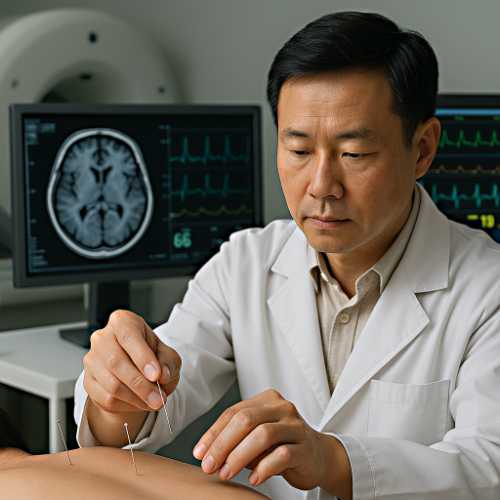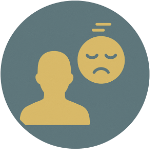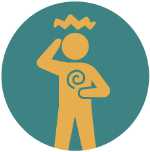Beyond the Myths:
Is Traditional Chinese Medicine Scientific?
For centuries, Traditional Chinese Medicine (TCM) has faced skepticism in the West. Critics often dismiss it as pseudoscience or reduce it to "needles and herbs." Yet modern research continues to reveal that Chinese medicine is not only rooted in systematic observation but also capable of producing measurable results. While it may not conform neatly to Western definitions of science, TCM reflects its own rigorous tradition of empirical study and clinical effectiveness. 
The "Pseudoscience" Label
The most common charge against TCM is that it lacks scientific grounding. Acupuncture meridians, for example, do not correspond to discrete anatomical structures that can be dissected and displayed. Yet numerous studies have demonstrated their functional presence. Radioactive tracers injected at acupuncture points have traveled along predictable meridian pathways. Similar phenomena have even been observed in animals and plants—organisms without the nervous systems often cited as the supposed explanation.
What TCM Offers Today
- Pain relief: Acupuncture is widely used for musculoskeletal pain and post-surgical recovery.
- Women's health: Effective in menstrual pain, infertility, and labor support.
- Immune support: Stimulates natural killer cells and regulates inflammation.
- Stress and sleep: Acupuncture and herbal therapy improve anxiety, insomnia, and fatigue.
- Holistic care: Qigong, taiji (tai chi), and dietary therapy promote long-term balance, not just symptom relief.
What Western critics sometimes overlook is that Chinese medicine developed from a different philosophical and methodological base. Instead of reducing health to isolated parts, it embraced pattern recognition, holistic thinking, and centuries of trial and error. Just as handwashing was once rejected before germ theory took hold, acupuncture and herbal medicine have suffered from institutional rigidity rather than lack of evidence.
Another frequent dismissal is that TCM works only through the placebo effect. Yet clinical research contradicts this view. Acupuncture has been shown to reduce blood pressure, increase immune activity, and improve post-surgical recovery in both humans and animal models, where belief plays no role. Ear acupuncture has matched pharmaceutical treatments in certain cases of insomnia, while laser acupuncture has enhanced white blood cell activity.
Perhaps the most striking evidence comes from a large-scale investigation in China during the 1970s. Over 63,000 participants reported sensations propagating along meridian pathways, far exceeding rates explainable by placebo. If TCM were merely suggestion, it would not produce consistent physiological responses across so many individuals, cultures, and even species.
More Than Needles and Herbs
While acupuncture and herbal formulas are the most visible aspects of TCM, the system encompasses much more. Dietary therapy teaches how food can prevent or correct imbalances. Practices such as qigong and taijiquan (tai chi) regulate breath, movement, and energy for long-term health. Moxibustion, cupping, gua sha, and tuina massage all offer additional therapeutic avenues. Together, these approaches reflect a comprehensive medical tradition designed not only to treat illness but also to sustain wellness.
TCM is increasingly recognized in modern healthcare. The Australian "Acupuncture Evidence Project" reviewed over 1,000 studies, finding moderate to strong evidence for acupuncture in dozens of conditions ranging from pain and nausea to migraine and hypertension. Herbal medicine has also contributed significantly: the malaria drug artemisinin, derived from the herb qīnghāo (青蒿), earned scientist Tu Youyou a Nobel Prize in 2015.
Moreover, TCM has been applied effectively in modern crises. During the COVID-19 pandemic, classical formulas such as Qingfei Paidu Decoction were widely used in China with reported success. Such examples demonstrate how an ancient framework continues to adapt to contemporary challenges.
Rethinking Science
Perhaps the real issue is not whether Chinese medicine is scientific, but how we define science itself. Western science privileges measurable, quantifiable structures, while Chinese medicine grew out of Daoist naturalism, Confucian ethics, and careful observation of living patterns. Every breakthrough in modern science, whether germs, circulation, or electricity, already existed long before its "discovery." By that measure, it becomes difficult to deny the possibility of realities we have not yet measured or explained. Chinese medicine works with these subtler layers of human experience, relying on centuries of clinical validation. Rather than dismissing what cannot yet be proven, perhaps the wiser view is to accept that science is an evolving lens. What lies outside its current frame today may become tomorrow's undeniable fact.





